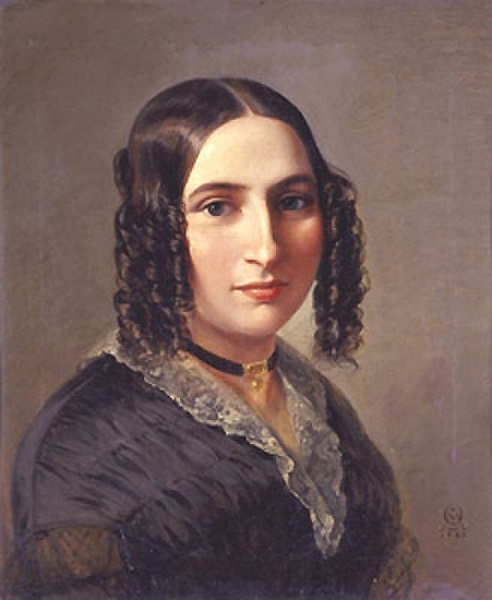Famous Last Names – Celebrating Women’s History Month
When you hear the names Mozart, Mendelssohn, and Mahler, chances are that male musicians come to mind. However, many of these famous names in classical music had female counterparts that played an essential role in the development of music. Historically, most women were discouraged from seeking professional careers in music… but that didn’t stop them from trying. These women, often overshadowed by their male counterparts, contributed significantly to the development of music and culture. Their stories highlight the perseverance, talent, and ingenuity of women throughout history. By acknowledging their contributions, we not only give them the recognition they deserve but also inspire future generations of women to pursue their passions, regardless of societal constraints.
In honor of Women’s History Month, let’s get to know some of the women behind famous last names in classical music:
Francesca Caccini (1587-1640)

Florentine composer Francesca Caccini came from a musical family. Her sister, mother, and stepmother were all proficient singers, and her father, Giulio Caccini, was a well-known composer. Giulio was one of the founders of opera as a musical genre. His opera, Euridice, was one of the first operas ever to be published. Following in her father’s footsteps, Francesca took to music from a young age and quickly established herself as a gifted singer. Unlike most women musicians at the time, Francesca performed and composed as a profession and became the highest-paid musician at the Medici court. In another groundbreaking achievement, in 1625, she became the first (known) woman to write an opera. Francesca was, in every sense of the word, a trailblazer.
Maria Anna Mozart (1751-1829)

Maria Anna Mozart (nicknamed “Nannerl”) was the older sister of Wolfgang Amadeus Mozart. Five years older than her famous brother, Nannerl was arguably as skillful and extraordinary a musician as Wolfgang. In addition to composing, she toured around Europe as a pianist when she was a child and was considered one of Europe’s best young musicians. Unfortunately, given the customs of the time, Nannerl had to give up performing when she became eligible for marriage. We can only wonder how much of an impact Nannerl had on her brother’s own musical development. Was she a source of inspiration for him? What could have happened if she had been able to continue her career as a musician into adulthood?
Fanny Mendelssohn Hensel (1805-1847)

There are many parallels between Nannerl Mozart and Fanny Mendelssohn Hensel. Like Nannerl, Fanny was the older sister of a famous composer, Felix Mendelssohn. She became a proficient pianist at a young age and was considered to be a musical genius. And, like Nannerl, once Fanny was of marrying age, she was forced to abandon her professional musical pursuits. Fanny fought against these restraints by hosting weekly private concerts that notable artists and members of society attended. She also continued composing, culminating in nearly 500 works, though many have yet to be published. Fortunately, Fanny’s music is gradually resurfacing in concert halls as more and more listeners fall in love with her distinctive musical voice.
Clara Schumann (1819-1896)

Clara Schumann (born Wieck) was a piano prodigy and the daughter of prominent musicians. She made her professional debut as a pianist at 11, a career she would continue for the rest of her life. She was also a composer, though her works have been overshadowed by those of her husband, Robert Schumann. Unlike other women featured in this post, Clara was able to continue her work as a musician after marrying Robert. The couple’s relationship was pretty collaborative. They would even write romantic pieces for each other and present them as gifts. When Robert died in 1856, Clara stopped composing and instead devoted her energy to touring as a concert pianist while promoting her husband’s compositions.
Alma Mahler (1879-1964)

Alma Mahler (born Schindler) captured the hearts and minds of many artists in Vienna and beyond. A true socialite and muse, Alma grew up surrounded by the period’s most active creative voices – musicians, painters, directors, and more. Alma became interested in composition in her teens and wrote several sets of songs for voice and piano. After marrying composer Gustav Mahler at 22, Alma agreed to forgo composing and focus on supporting her husband’s musical career. Consequently, only 14 of Alma’s works survive today. Alma’s music is lyrical and intensely romantic, making the fact that it was written in her late teens and early twenties all the more impressive.
Imogen Holst (1907-1984)

British composer Imogen Holst received an extensive musical education with some of the country’s finest teachers and composers thanks to her father’s connections. Imogen’s father, Gustav Holst, was most famous as a composer, particularly for the orchestral work, The Planets. Imogen became an exemplary composer herself but never emerged from her father’s shadow. That doesn’t make her contribution to classical music any less significant. In fact, throughout her life, Imogen fiercely advocated for her father’s music more than her own and played an essential role as an educator and choral director.
Summary
In this article, we celebrate the often-overlooked contributions of women in classical music, highlighting the lives and achievements of Francesca Caccini, Maria Anna Mozart, Fanny Mendelssohn Hensel, Clara Schumann, Alma Mahler, and Imogen Holst. These women defied societal norms and made significant contributions to the world of music, leaving a lasting impact on the arts. As we honor Women’s History Month, it’s crucial to remember and recognize the remarkable women behind these famous last names, who paved the way for future generations of female musicians and composers.
To keep learning, check out our post – Courageous Girls in Music: Books for Women’s History Month!
